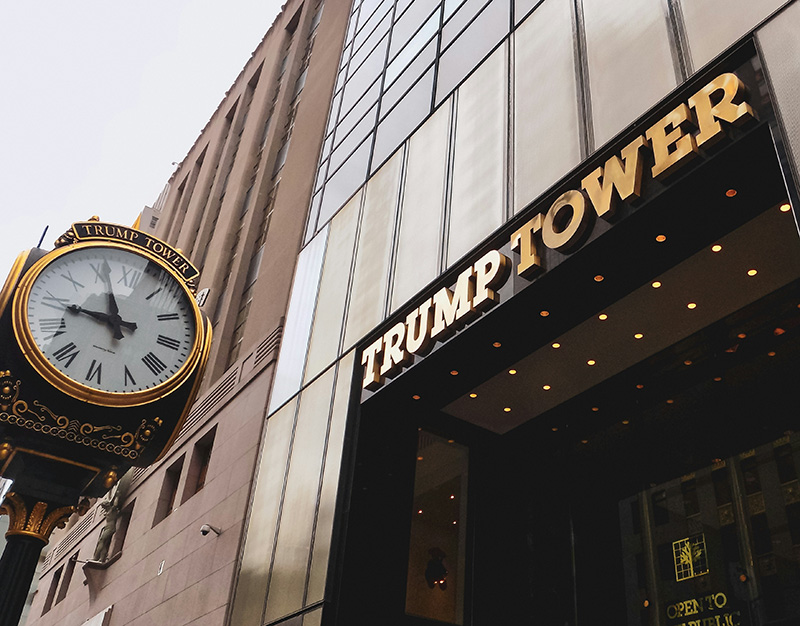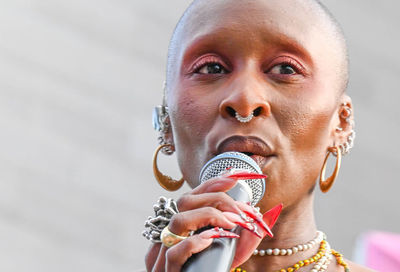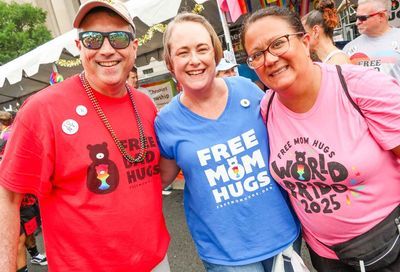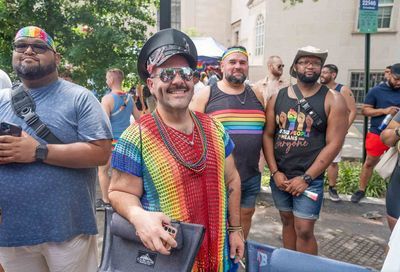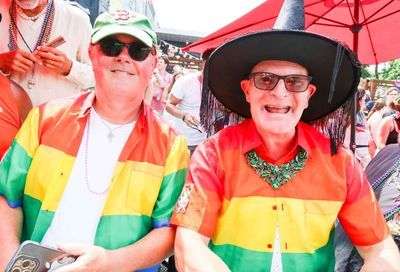Marriage Update
Log Cabin launches anti-FMA campaign; California puts the brakes on, while Massachusetts may be moving forward
You may have noticed a new Republican advertising campaign on gay marriage playing on your television screen. This time, however, it’s a campaign to stop the proposed Federal Marriage Amendment (FMA) to ban gay marriage.
Log Cabin Republicans unveiled the million dollar campaign last week with a press conference on Capitol Hill. The centerpiece of the campaign is a 30-second black and white television ad that features footage of Vice President Dick Cheney during the 2000 campaign defending the option of states to choose to recognize same-sex relationships.
 Log Cabin’s Patrick Guerriero (Photo by Todd Franson) |
 “The radical right wanted a culture war — they’ve got it now,” said Patrick Guerriero, Log Cabin’s executive director. “We will not remain silent if gay and lesbian families are used as a wedge issue in this election.”
“Loyalty doesn’t mean checking one’s principles at the door, loyalty means having the courage to tell someone when they are wrong,” he said. “As Republicans, it is our obligation to stand up and speak out when our party is headed in the wrong direction.”
Log Cabin spokesman Mark Mead was on the floor of the 1992 Republican National Convention when Pat Buchanan stepped to the podium.
“I witnessed Buchanan launch the culture war that helped defeat the first President Bush,” said Mead. “It felt like I had been kicked in the stomach when Buchanan made his antigay tirade. I felt the same sensation last month when the current President Bush endorsed an antifamily constitutional amendment.”
“The party must return to its principles: federalism, states rights, and liberty for all Americans,” said Bob Kabel, former chair of Log Cabin and a Bush delegate to the Republican National Committee in 2004 from Washington, D.C.
“We don’t think that we should freeze history by amending the Constitution in the midst of this great national debate,” Guerriero said.
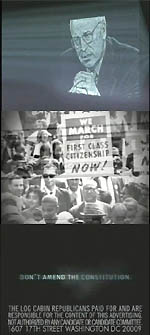 |
The television ad began running on March 11 in the Washington metro area and in seven swing states where much of the presidential campaign will be focused: Florida, Minnesota, Missouri, New Hampshire, New Mexico, Ohio and Wisconsin.
“The fight against the constitutional amendment,” Guerriero said, “has woken up the giant which is the millions of gay and lesbian Americans, our families, our neighbors, our coworkers, who simply don’t want to remain silent during this historic moment as the nation grapples with how to recognize gay and lesbian families.”Â
Guerriero chastised the White House for listening to political advice from Gary Bauer, Pat Robertson, and Pat Buchanan. “I would remind them that they are all failed presidential candidates. In fact, all of them have run against Bushes in their lifetimes. I’m not sure why Karl Rove would spend his time taking counsel from failed presidential campaigns.”
He left open the possibility that Log Cabin still might endorse Bush’s reelection — that is a decision that will be made by the board, after the convention. Part of that decision will depend on what happens between now and then; whether gay marriage is used as a wedge issue by the campaign and what, if anything, is offered to gay Americans.Â
“We know what the President is against — he’s against gay marriage. So is John Kerry,” said Guerriero. “We want to know what the President is for. Does he support civil unions? Does he support domestic partnerships for federal employees?”
Log Cabin did not endorse the elder Bush’s reelection effort in 1992, in which he was defeated by Bill Clinton.
Setback in California
Same-sex marriage hit a roadblock last week when the California Supreme Court ordered San Francisco officials to stop issuing licenses to gay and lesbian couples, at least for now. That same day, the Massachusetts legislature took the first steps toward amending the state constitution to outlaw gay marriage but create civil unions — or did it?
The euphoria in San Francisco came to an end at 2:30 p.m. on March 11 when the city stopped issuing marriage licenses to same-sex couples.
The California Supreme Court unanimously ordered the injunction on the narrow question of whether the city had the authority to issue the licenses under state law. It avoided the greater constitutional issue of whether a failure to issue such licenses discriminates against gay couples.
“All that happened today is that matters were put on hold. This ruling hits the ‘pause’ button, not the ‘stop’ button,” said Jon Davidson, an attorney with Lambda Legal.
That same afternoon the city filed suit on the broader issue of equal protection, and the following day the National Center for Lesbian Rights (NCLR) filed suit on behalf of six same-sex couples denied marriage licenses. Lambda Legal, the ACLU, and other organizations joined in the lawsuit.
The constitutional question will likely take more than a year to work its way to the California Supreme Court.
The status of the marriages already performed is left in legal limbo. In the 29 days since San Francisco began, it issued marriage licenses to 4,161 gay and lesbian couples. Appointments had been scheduled for an additional 2,688 couples, both same-sex and heterosexual.
On the other side of the country, the Massachusetts legislature, meeting as a constitutional convention, overwhelmingly voted three times for a state constitutional amendment that would limit marriage to “the union of one man and one woman” and establish civil unions for same-sex couples that “provide entirely the same benefits, protections, rights, and responsibilities that are afforded to couples married under Massachusetts law.”
A fourth affirmative vote is required for the convention to pass the amendment, and a subsequent session of the legislature also must pass the amendment before it is sent on to the public for a vote in 2006.
The fat vote margins reflected procedural maneuvers on the part of gay rights advocates propping up the “compromise” amendment in order to defeat worse alternatives. The worst alternative — to ban gay marriage without mentioning civil unions — went down 136 to 62.
Now they hope to defeat the compromise so that no constitutional amendment moves forward at all. That would allow the ruling in favor of gay marriage by the Massachusetts Supreme Judicial Court to stand.Â
The legislature returns to sit as a constitutional on March 29-31 when new and recycled amendments likely will be considered. Gay advocates hope that they can continue to run out the clock and keep any amendments from passing.
Even if supporters of the “compromise” amendment manage to cobble together a bare majority to pass it, many observers believe it will be a compromise without a constituency and may well be defeated by voters.
Support Metro Weekly’s Journalism
These are challenging times for news organizations. And yet it’s crucial we stay active and provide vital resources and information to both our local readers and the world. So won’t you please take a moment and consider supporting Metro Weekly with a membership? For as little as $5 a month, you can help ensure Metro Weekly magazine and MetroWeekly.com remain free, viable resources as we provide the best, most diverse, culturally-resonant LGBTQ coverage in both the D.C. region and around the world. Memberships come with exclusive perks and discounts, your own personal digital delivery of each week’s magazine (and an archive), access to our Member's Lounge when it launches this fall, and exclusive members-only items like Metro Weekly Membership Mugs and Tote Bags! Check out all our membership levels here and please join us today!









